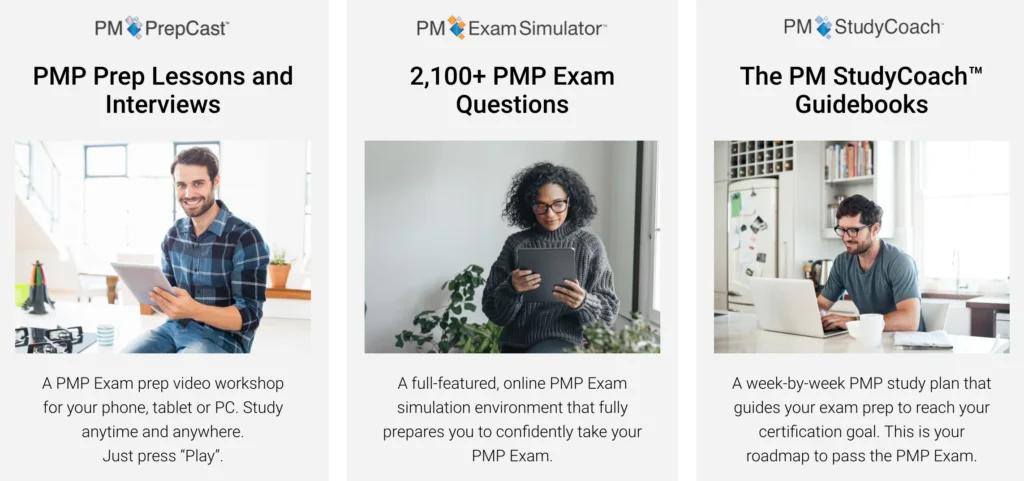- Best EdX Criminology Courses Guide - August 16, 2022
- Best EdX Design Courses That Could Help Jumpstart Your Career - August 16, 2022
- EdX vs Pluralsight - August 16, 2022
The Project Management Institute (PMI) just released its 12th survey with compelling results, showing salary increases and industry growth. And now’s a great time to review one of the most popular online PMP courses, Bran Sensei, to see if taking the PMP certification exam and preparing for it is worth your time and money for online exam prep.
The 12th “Earning Power: Project Management Salary Survey” was featured in Business Wire with some promising signs that PMP remains useful for the end of 2021 and into 2022. The survey was administered from March to June, including an impressive sample size of over 30,000, 79 percent of which have a PMP certification.
Twenty-two percent of participants reported increased salaries of about 5 percent, compared to before certification. It’s also notable that reported salaries were over 15 percent higher than median salaries for relevant project management positions.
Those in the United States benefited most, followed by those residing in Australia. Still, the report noted that salary increases held for nearly every country of the 40 surveyed. At least looking at these survey results, it would seem that the PMP is very worth it.
But is there data to replicate these stunning results? And is an online prep course like Brain Sensei PMP worth your time and money?
In this guide, I’ll tell you how to decide if PMP certification is worth it how to prepare– and what to expect– when you take the exam. I’ll finish with a review of Brain Sensei PMP and my honest recommendation if you should use this online learning platform to jump-start your career.
Main Pros and Cons for Brain Sensei
Pros for Brain Sensei
- Money-back and pass guarantees
- Updated for latest PMP curriculum
- Unique narrative lessons
- Effective retention model
- 35 contact hours for PMP training
- Co-founded by PMP professionals
- Live instructor option and self-paced option
- Ample mock exams and practice questions
Cons for Brain Sensei
- Expensive
- Not all modules are narrated
- Mock exams may be too easy
- Limited 1-year access (with exceptions for Pass Policy)
Is a Project Manager a Good Job?

Since the main purpose of the PMP certification exam is to complement a career in project management, I want to take a moment to touch on the pros and cons of pursuing a job within this field. Project Management is known as an in-demand career, with the potential for very liveable to higher salaries and job stability.
At the same time, project management requires specific skills and managers can face arduous schedules. That way, you won’t waste your time with online learning and exam prep if the field doesn’t interest you.
What Exactly Does a Project Manager Do?
Project management is an umbrella term that encompasses many fields. You can be a project manager for industries such as construction, energy, software development, engineering, IT, healthcare, marketing, and even pharmacy. Notable companies that hire project managers include Microsoft, JP Morgan Chase, Bank of America, Accenture, Ericsson, Google, Amazon, and countless others.
Of course, where you can be a project manager depends on your other credentials and background. Responsibilities include organizing and planning different projects. You’ll start with a general goal and plan and guide employees to meet deadlines and objectives.
Often, you’ll be tasked with troubleshooting, connecting with stakeholders, and managing finances. This just goes to show that project management is both demanding and rewarding– it’s not monotonous and always has new challenges.
What is a Typical Career Path for a Project Manager?
There is no one typical career path for a project manager. Some begin working at a marketing or consulting firm, then branch out into a field of any interest or area of expertise. Experience and getting certified, as well as making professional connections, are all excellent ways to advance your career. Getting in required PMP training is essential for promotion.
Is Project Management a 9 to 5 job?
While some project managers work in settings that are 9 to 5, I’d never classify project management all as a 9 to 5 job. Project management may require irregular hours and hours beyond a traditional workday.
That will vary depending on whom you’re working for and what stage of the project you’re on. You should expect to be on call– answering emails and phone calls even when you think you’re off. This is another reason why the job can be stressful and why balancing hard work ethic and work/ life boundaries is essential.
What is a Project Manager’s Salary?
It’s tricky to track down salaries since project management is involved in so many different fields. According to data collected by the 11th edition of the Project Management Institute Salary Survey, the median salary is around $116,000, with an average salary range of $93,000 to $140,000. Entry-level salaries start at $56,000 to $84,000 or a median of $70,000.
All told, project management offers competitive salaries.
Can Anyone Become a Project Manager?
While technically anyone can become a project manager, almost always you’ll advance with expertise in a certain field or industry. A bachelor’s degree is common, and sometimes a master’s. Experience and certification are important too. You can get a degree in a general subject area or a degree in project management.
Is PMP Certification Still Worth it?
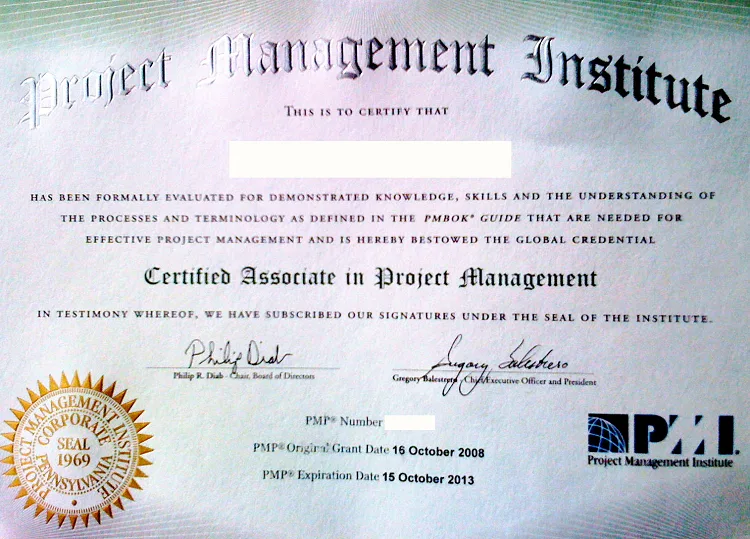
The question is: even if you’ve decided to go into project management– or are looking to advance your career– is the PMP certification exam worth your time and efforts? That answer depends– but in many cases, the answer is yes. While it’ll take exam prep, PMP can advance your career.
Is PMP a Professional Designation?
PMP stands for Project Management Professional Certification. It’s a regarded and respected designation that means you’ve met criteria for certification based upon the Project Management Institute.
It’s likely to be recognized by employers and can give you a leg up in job applications. And since a PMP certification doesn’t come easily, it’s all that much more respected. PMP certification requires PMP training, exam prep, and dedication.
Is PMP Equivalent to a Degree?
It is important to understand that there are limitations on how PMP is regarded. It’s not the same as a degree, nor is a professional certification ever considered equivalent to a degree. Rather, it’s meant to complement your education and experience. However, you do have to have a bachelor’s degree even to pursue a PMP certification.
Do You Need PMP if You Have an MBA?
You need a bachelor’s degree to pursue a PMP certification, but, on the other hand, you don’t need PMP if you hold an MBA. Through experience and other means, you can potentially become a project manager– but you’re increasing your chances with a certification.
Is PMP Certification Rare?
It’s not so much that certification is rare as much as the exam has a high failure rate–anywhere from 40 to 50 percent fail to pass the exam the first time they take it. In some ways, there’s an upside to this; it’s regarded higher than an easier examination likely would be. Because of this– as well as the growth in the project management industry– it’s still in demand.
Can PMP Get You a Job?
As is true for any professional certification, there’s no guarantee that you’ll get a job. What it can do is make you stand out more from other applicants. Taking and studying the exam may also widen your insight and perspective for the field.
Does PMP Increase Your Salary?
As indicated by survey results, a certification has the potential to increase your salary, but it doesn’t happen for everyone. Even if it does not immediately happen, a certification could increase your earning potential.
Is PMP the Right Certification for Me?

Certifications can be helpful– but I firmly believe that you should think about whether or not PMP is the best fit for your career goals and whether you’re willing to pursue PMP training and exam prep.
Which is Better: PMP or ITIL?
ITIL stands for IT Service Management and is meant for project managers interested in IT. PMP is better for learning general project management and versatility, while ITIL is focused on teaching technical skills.
Which Certification is Best: PMP or PRINCE2?
Another alternative to PMP is PRINCE2. PRINCE2 is much easier to pass than the PMP certification exam, but both are well known. PRINCE2 tests methods for implementing goals, while PMP covers more materials and aspects of project management. I think PMP is the superior option to prioritize for exam prep, but both can be helpful.
Which is Better: PMP or CAPM?
The situation is similar to CAPM vs. PMP. Once again, CAPM is the easier exam– and less expensive– but it’s also niche and not as well regarded. CAPM is the Certified Associate in Project Management and is based on knowledge, while PMP focuses more on experiences. Thus, PMP has a more immediate practical application.
Is PMP Better than Six Sigma?
Six Sigma was designed by an engineer in 1986 and is a methodology to optimize process improvement– a general business model of analyzing and integrating information. Six Sigma is respected, but PMP provides a bit more versatility.
Which is Harder: PMP or CISSP?
However, there is a certification that is more difficult than PMP and that’s CISSP. While PMP has 40 to 50 percent failure rates, CISSP pass rates are substantially below 50 percent. CISSP stands for Certified Information Systems Security Professional. This exam is more important than ever to find genuine practice questions and other resources.
Which Certification is Best After PMP?
After you take PMP, you may not need or further benefit from another certification. Still, other project management certifications you can consider include CAPM, CSM, COMPTIA, and PRINCE2, depending on your career goals.
Can I Take the PMP Certification Exam without Experience?
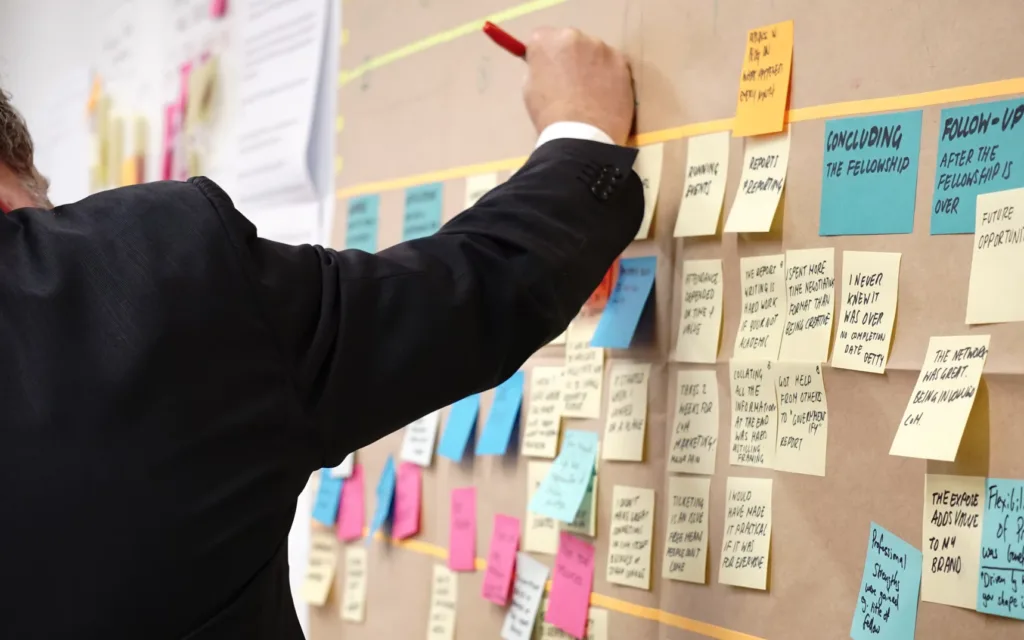
You’ll need both PMP training and a bachelor’s degree to pursue the PMP certification exam. That’s another factor in the difficulty level for this certification and why it’s valued. Since PMP values experience, you’ll need a minimum of 3 years of leadership and/or management experience even before exam prep. To prove your work experience for PMP, I recommend creating an excel sheet to log your hours. It’s important to note that some military experience can count, though it depends. To be sure, click here for military experience policies.
How Do You Get 35 Hours of Project Management Education?
You’ll likewise need a total of 35 hours of project management education. This is accomplished by taking coursework through a platform like Brain Sensei.
How Long are PMP Contact Hours Good for?
The good news is that those 35 PMP training hours won’t expire, so you aren’t pressured to take and pass your exam within a certain time.
How Hard is the PMP Certification Exam?
As I’ve iterated, the pass rate for the PMP exam is fairly low– with 50 percent being a higher estimate. It’s a challenging exam, but knowing the testing protocol is the first step to getting yourself off to a good start.
That, combined with taking mock exams, makes you aware of what you’re about to face. The right PMP online learning course can make a difference, and this is why.
Is PMP Changing in 2021?
PMP changed its exam in 2021. As is the case with most professional exams, updates happen periodically, and often there’s some anxiety about those changes. Some say the new exam is harder, while many will argue it’s simply holding up its reputation as one of the more difficult professional exams, with a great deal of content to cover.
Can I Take the PMP Exam from Home?
Testing environments matter too. I have experienced different performance levels based upon a test being delivered via paper versus computer-based– and everyone is different.
And, of course, the pandemic has added some level of volatility for testing. In August 2021, it was announced that you could take the PMP exam at home via a PC or tablet. However, it’s important to check for updates as this can change. You’ll need to have a webcam on the entire to ensure you aren’t cheating and, of course, a reliable internet connection.
Is it Better to Take the PMP Certification Exam Online or in Person?
There are understandably pros and cons to testing at home. Taking the exam online at home means no stress from travel, checking in, and any health concerns you may have. It may be more comforting to take it at home vs. a sterile testing environment. At the same time, testing at home means you must be in a secure, quiet environment.
Some may find it harder to concentrate at home, while others have privacy concerns regarding webcam requirements. Scheduling is different as well. One advantage to learning PMP online is if you plan on taking the exam online, you’ll be better prepared.
Is the PMP Certification Exam an Open Book?
It probably comes as no surprise that the PMP certification exam, with a reputation for being difficult, is a closed book exam. You may not refer to any notes or other materials– hence the need for the webcam requirement if you’re testing at home.
Thus, if you plan on taking the online exam, I recommend keeping this in mind even as you’re reviewing PMP practice questions.
Can I Use a Calculator on the PMP Certification Exam?

You will be provided with a screen calculator, but you may not use your calculator. Microsoft makes the calculator and I recommend practicing with it as you study.
What is the Hardest Part of the PMP Certification Exam?
There are two parts I believe are the most challenging. The first is the breadth of information. Compared with other project management examinations, PMP covers a wealth of information. The second is the test duration. Clocking in at a little over four and a half hours, exam fatigue and nerves are common.
Can I Drink Water During the PMP Online Exam?
Whether you’re taking the test at home or in person, not only can you drink water, but I encourage you to bring water and a snack. You can’t drink or eat while you’re taking the exam, but there are permitted breaks. Aim to hydrate just enough– hydration also improves your concentration, mood, and stamina.
A snack with a bit of protein and complex carbohydrates is also an excellent idea. Avoid eating or drinking something new or anything high in simple sugars. And try to keep to your normal caffeine intake– don’t bump it up for the test.
What is the Passing Score for the PMP Certification Exam?
The standards are rather high to pass the PMP certification. You’ll need to correctly answer a minimum of 141 out of the total 175 questions– which equates to just under 81 percent. Keep track of your scores as you practice with questions and mock exams to see if you’re on track.
Do You Get Your PMP Certification Exam Results Immediately?
No need to worry about your score for a while– you’ll receive your results instantly, as well as an official email a few weeks later with your score records.
What Happens if I Fail the PMP Certification Exam?
There’s good news and bad news about failing the PMP exam. You have three times within a year to take it, but after those three times, you must wait a whole calendar year before attempting again. There are also the exam fees to contend with: you have to pay a new fee each time you take the PMP exam.
What is the PMP Certification Exam Fee?

And this is another reason why you want proper exam prep: the fees. With a PMI membership, you pay $405. That’s a lot until you consider that non-members pay $555 every time they take an exam.
However, if you’re in the Air Force, Navy Cool, or GI Bill eligible, there are a few opportunities. Occasionally an employer may help, though this isn’t that common. Note that usually exam fees are covered, but learning fees for an online PMP course are typically not.
Does the Air Force or Navy Cool Pay for PMP Certification?
Funding is provided through Air Force Cool for a one-time exam fee, mostly to those at E-7 ranking or greater. Navy Cool’s program goes even further, funding both PMP and CAPM exam fees, as well as any additional related fees, though there are criteria for this funding.
Will GI Bill Pay for PMP Certification?
The GI Bill will pay for initial exam fees for eligible veterans but not any additional feeds.
How Much is the PMP Renewal Fee?
Another cost: the renewal fee. PMP expires every three years, and renewal costs $60 for members of PMI or $150 for non-members.
How Do I Pass the PMP Certification Exam?
You’ve decided to take the PMP certification exam: now what? As you know that the pass rate is low and the fees are high, you’re going to want to put a lot of effort into exam prep. You need to plan and have a dedicated study plan, all the while making sure you have the required experience, project hours, and a bachelor’s degree or higher.
Since your PMP training hours don’t expire, give yourself plenty of time and resist the urge to take an exam before you’ve truly followed a dedicated studying schedule. Online learning can be helpful in this regard as it’s easier to keep track of your progress.
How Can I Prepare for PMP Certification Exam in 30 Days?
Whenever I see something about preparing for an important event or exam in 30 days, I’m skeptical, and for a good reason. Thirty days simply isn’t enough for most to prepare for PMP. You can, however, cover a good deal in 30 days with this 30-day PMP study plan.
Since there isn’t a strict deadline to take the exam, you don’t need to crunch in 30 days, but this could be a solid plan for 30 days before the exam, no matter how long you’ve studied. You’ll also want to make sure you’re taking PMP mock exams and investigating what practice questions you get right or wrong.
How Long Should I Study for the PMP Certification Exam?
Instead of thirty days, I recommend studying three to four months if you can commit an average of a few hours a day. If you can only squeeze in an hour or half an hour a day, double that to six to eight months. Of course, this provides a general timeline and isn’t meant to be prescriptive.
What is the Best Way to Pass the PMP Certification Exam?
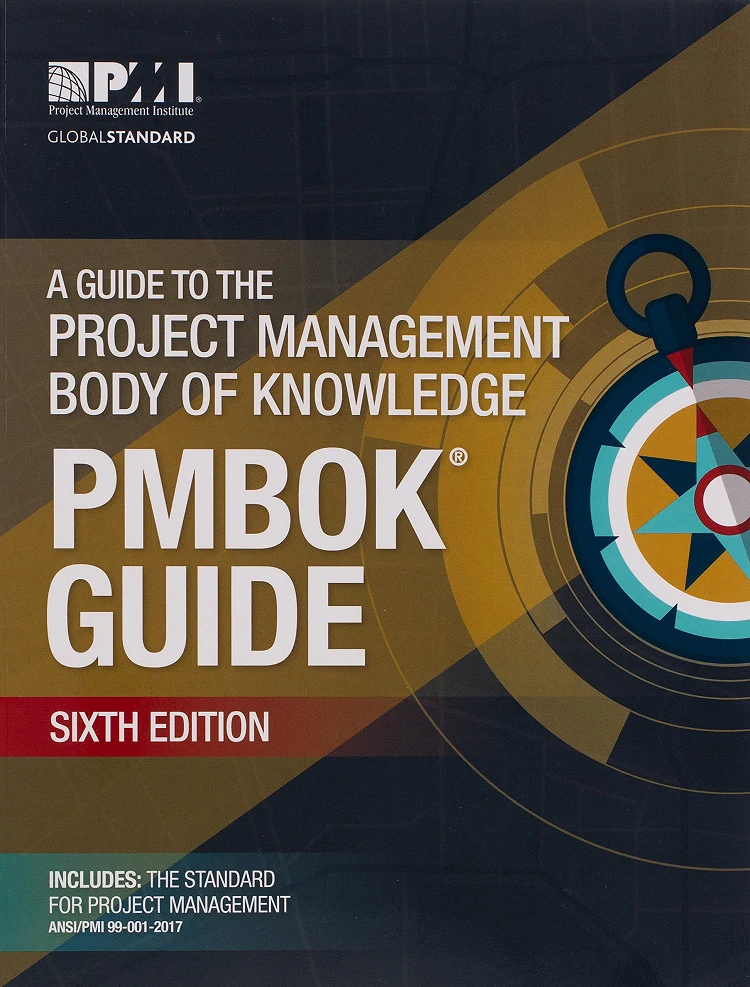
As far as studying for PMP, there are several things you can do in terms of organization and training hours.
Study the PMBOK– and Other Guides Second
First, look at the PMBOK Guide. This guide is your number one priority, as it’s the official guide for the exam. While dense and daunting to get through, the guide helps you understand the concepts and the way the exam is structured. The exam is still largely based upon the 6th edition, though insight can be drawn from both the 6th and 7th editions.
The guide created by the Project Management Institute may be supplemented with other guides, but this guide should be your priority. The Rita Book is a great resource too, but not enough to pass. Taking mock exams and answering practice questions is also key to understanding timing and strategies and questions you can expect.
Be Choosey with PMP Training
Those 35 PMP training hours aren’t just something to check off your to-do list. During those hours, you should be fully immersed and committed. Selecting a reputable place to get in those 35 hours is also critical for exam success.
Be Consistent with Study Hours
Total hours studied isn’t the only important metric. Plan for a consistent schedule, ideally studying about the same number of hours every day or as close as possible. It’s far better to be slow and consistent than cramming for your exam in 30 days. Meanwhile, online learning can provide more flexibility, so long as you’re disciplined.
Find a Great Online PMP Course
Learning online can be self-paced or personal. Either way, finding a great PMP course focuses your study plan and ensures you get practice questions, mock exams and more.
How Can I Use PMP Certification to My Advantage?

If you decide to earn a PMP certification, there are ways you can add your new qualifications to your LinkedIn, CV, resume, and email signature to improve your employment prospects.
Should I Put PMP Behind My Name?
You can add the PMP certification directly behind your name on your email signature. However, you are not permitted to use the PMP logo as a badge to your email signature.
How Do I Announce My PMP on LinkedIn?
You can easily add PMP to your LinkedIn profile. Simply log in to your account and locate “Accomplishments” on your profile. You’ll see a plus sign and the option to add certification. Project Management Professional is an option.
How Do You Include PMP on a CV?
I recommend adding a certifications option for your CV or resume. Adding training and certification dates is a great idea. Just as you can add it to your title on an email signature, you can add PMP at the top after your name.
Is Brain Sensei Good for the PMP Certification Exam?- My Review
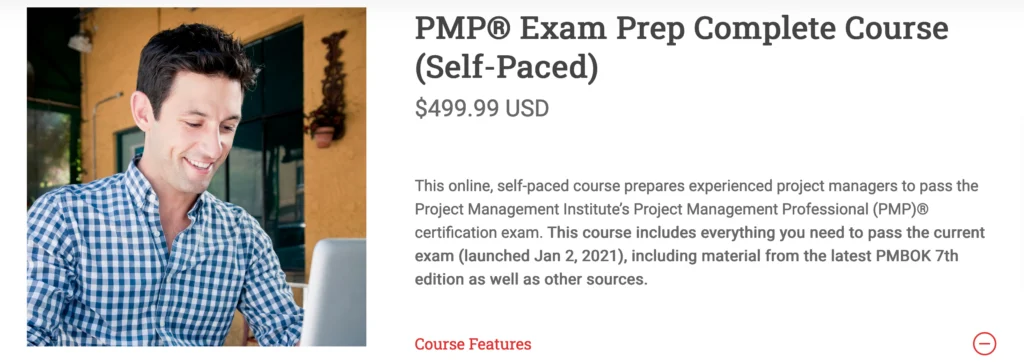
As those 35 contact training hours are important, I wanted to provide you with my honest opinion of Brain Sensei for online exam prep.
For my review of Brain Sensei PMP, my criteria consist of the following: value price; organization and structure; user experience including active learner; personalized resources; mock exams and practice questions; and how closely the PMP course materials are linked to official PMP criteria.
I’ll tell you if you should pursue online learning through this platform with these criteria.
What is Brain Sensei?
Brain Sensei is a complete online learning PMP prep course. What I like most about it is that you can get your 35 PMP training hours all through online learning. The course is structured and focuses on a sensible curriculum, allowing even those of us who are less organized to stay focused and on track.
How Long Does it Take to Complete the Brain Sensei PMP Course?
There is a limit to the materials you have access to, and for this reason, I don’t recommend using Brain Sensei alone for your preparation. On average, students get through all the online learning materials within a month to two months. With this in mind, you can pair something like Brain Sensei with studying the official PMBOK.
What’s Included with the Brain Sensei PMP Course?
Brain Sensei is entirely self-paced, meaning that you’ll be able to learn on your schedule, but it also means you won’t have much-personalized attention. With your purchase, you’ll receive:
- 4 Mock Exams (total of 800 practice questions )
- 9 Learning Units- Each Includes Key Points and Summaries
- 13 Story Tasks
- Tips Sent to Your Email
- 35 PMP Training Hours
- Access to Online Learning For One Year
Does Brain Sensei Offer Personalized Learning Support?

There isn’t much in the form of personalized online learning with the basic plan. You can join the Brain Sensei Facebook Group, where you can ask support-based questions. I was a little frustrated with this, and I think online chat boxes tend to be more efficient, and other services, like the ability to email tutors, are likely to provide more robust results.
While I understand the idea behind the self-paced online learning model, you’re paying a lot, considering there isn’t personalized support.
However, there is the option for a Live Instructor PMP Course. As of this writing, they’re sold out. The price, however, is double the self-paced option. The content is similar, but you get a more personalized experience. I appreciate this option, but it’s limited right now and very expensive at over $1,000.
What’s Learning on Brain Sensei Like?

One thing I will say about online learning through Brain Sensei: it’s unique. The interactive story model breathes life into usually dense studying materials. Depending on your personal learning style preferences, you may also find that storytelling makes for a more engaging learning experience.
By uniquely presenting information, I’d argue you’re more likely to retain the information, also using visual cues for associative learning. I also was pleased that the story included animations and voiceovers.
Unfortunately, the animations and voiceovers are not consistent throughout your learning. They are most heavily featured as you start learning, then taper off in favor of traditional powerpoints. The problem with this is that you’re putting forth one impression initially, only to resort to other methods later.
I don’t think there’s something entirely wrong with their other resources, but it detracts from what you may first find unique about the platform. I do like that you have explanations for your answers and key terms and summaries.
They also do have a thoughtful learning model, with definitions followed by examples, followed by questions. This reinforces your learning, which I find to be an effective model. They say they use an adaptive learning approach, but I didn’t see specific examples or evidence that the platform truly adapts to how one answers.
What’s the Brain Sensei PMP Course Curriculum Based Upon?
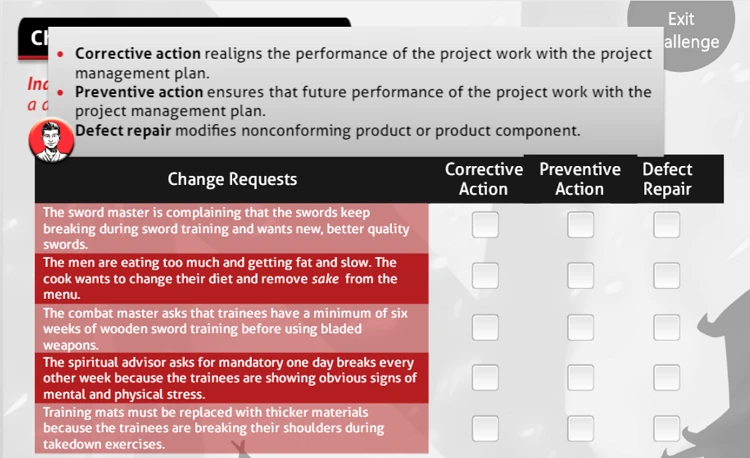
The curriculum exam prep is said to be based upon the PMBOK edition 7, which is the most recent version. The course is meant to cover both exam content as well as practical experience.
Learning models include: general terms; distinguishing between agile vs. mixed project vs. waterfall techniques; implementing agile techniques; combining predictive/ incremental/ agile/ iterative projects; using predictive models; identifying organizational issues; and studying for the exam.
Another thing I wanted to check in with is who designed Brain Sensei. Ideally, you want a preparation program designed by someone keen on PMP guidelines and standards. The two co-founders both hold PMP certification and have experience collectively as project managers, authors, and relevant backgrounds.
This is encouraging, though there’s no information about anyone else working with Brain Sensei. Since their materials are based upon the latest PMBOK edition, it seems they try to update their materials as needed.
Are Brain Sensei Mock Exams Helpful?
Brain Sensei provides four mock exams. Practice questions and exams, in my opinion, are critical for preparing for the exam. The problem is that the mock exams are not entirely realistic. While they ask questions that make sense, they may not be quite as challenging as the ones you’ll encounter on exam day.
Another note is that the practice exams require you to answer all 200 questions before you get feedback on answers. In some ways, this makes sense as it’s trying to mimic a test environment. On the other hand, some learners may want to see and understand their mistakes as they’re being made.
Does Brain Sensei Offer Any Discounts or Refunds?
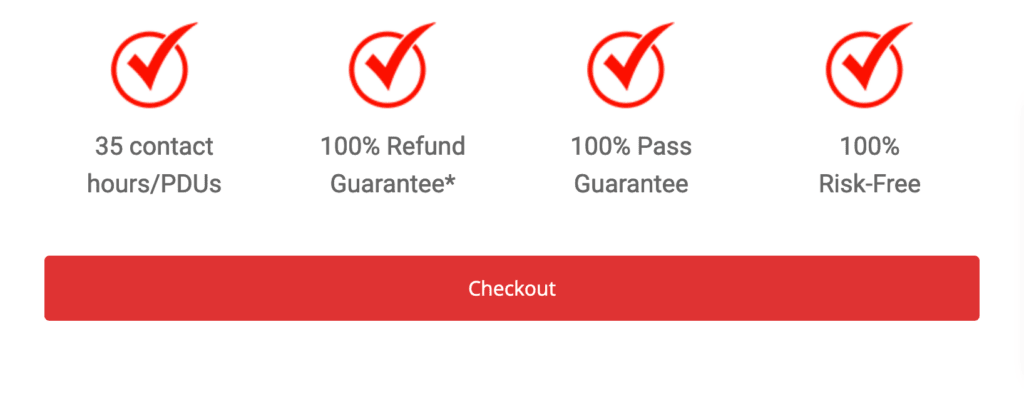
Brain Sensei is as expensive as taking the exam. Considering that you also only get one year of access, it’s understandable to want a discount. Unfortunately, Brain Sensei itself does not typically offer discounts. What they do offer is a free trial as well as refunds.
The refund covers 100 percent of your payment and is good for the first 30 days– plenty of time, in my opinion. However, there is a caveat: you can only start one practice exam. If you proceed beyond that, no refund will be given. I think this is a fair policy. To get a refund and stop your access, email [email protected].
What is the Brain Sensei 100 Percent Pass Guarantee?
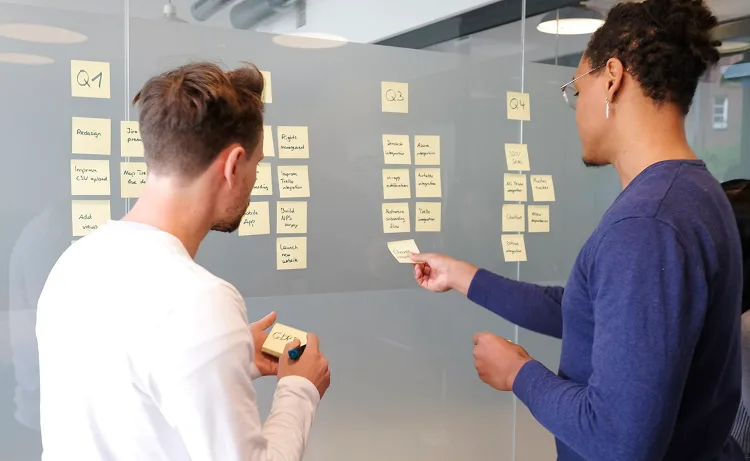
Their 100 percent pass guarantee is unique to the PMP course and rather generous. I also appreciate how detailed it is without additional disclaimers that you can’t easily see. Here are the highlights of the Brain Sensei Pass Guarantee Policy:
- Once you complete all modules and training, you’re eligible for a pass guarantee. You must take an exam within one year. Brain Sensei will provide 90 more days of free access if you fail that exam.
- The 90 days of free access is also offered for a second exam failure.
- For a third exam failure, you’ll be offered a full refund. However, I think that all of these exams must be taken within that one year to be eligible for refunds.
- You must provide failed exam scoresheets to prove you’ve taken the exam and failed it. These need to be official original score sheets and they must be provided every time. Normally you’ll regain access to materials within five business days.
Frequently Asked Questions
Answer: PMP certification is equivalent to NQF project level 5. NQF refers to the National Quality Forum and focuses on educational improvements and professional development within the United States.
Answer: Two weeks after you pass PMP certification, you should be sent an email via Credly. In that email, there will be an option to accept your badge.
Once you are accepted, you’ll be redirected to Credly, where you’ll need to make an account to access your badge. If you never get that invite, email contact [email protected]. If you’re confused about retrieving or using your badge, read their FAQs.
Answer: Your PMP membership card, separate from your certification, may be accessed via the PMI Membership Page. Browse over to the digital membership items section, then select to download your membership card. You’ll receive a digital PDF.
Answer: If you want to learn from someone who is PMP certified, or even if you’re looking to employ someone, you can confirm if they’re truly qualified. Simply head over to the PMI Registry where you can search by first and last name, credentials, and country.
PMP after someone’s name, of course, indicates that they meet the certification standards by the Project Management Institute, but this registry allows you to confirm such claims.
Answer: As is the case with all professional certifications and estimated salaries, no salary is guaranteed.
As reported by the PMI (Project Management Institute), those holding a PMP in India can expect to earn a median salary of ₹2,200,000 for real estate professionals, ₹1,900,000 for those in mining or agriculture, and ₹1,800,000 for the fields of consulting, healthcare and telecommunications.
Answer: Udemy offers PMP courses that can count towards the required contact hours for PMP certification. They have more of an a la carte services, with bite-sized, open-source courses. Anyone can take them because they’re open source, but, of course, you aren’t getting official PMP certification, just preparing.
Courses are priced individually and average $10 to $25 each. Of course, that can add up, and you’d need to be organized and log your hours. Another thing you may want to consider is that Udemy currently holds an F rating with the Better Business Bureau, so I can’t fully recommend even the Top Udemy PMP Courses.
Answer: You shouldn’t aim for the easiest certifications to obtain so much as ones that will support your career goals. With proper preparation and education, you can tackle even more challenging certifications.
That said, certifications that are generally considered easy to obtain include, information technology certifications, language-based certifications (such as ESL and TOEFL, depending on the language), certifications within healthcare, notary certifications, and some software and government certifications. But what’s easy for you may be more difficult for someone else.
Final Recommendation: PrepCast PMP Exam Prep
There is no one best PMP course, but one prominent competitor to Brain Sensei is PrepCast. Many wonder how good PrepCast is, with many similar features but at half the price for their basic plan. The PMP course fairs are even better among other student reviews than the Brain Sensei PMP course.
With your payment, you have access to over 59,000 real-world projects designed by project managers, 50 hours of video lessons, a 35-hour certificate for contact hours, 25 agile and hybrid lessons, and the ability to study on the go. They also offer a 90-day money-back guarantee. Plus, their curriculum is based on the latest PMBOK materials.
PrepCast is a good option for studying for the PMP certification exam if you want to save money. Optional features include a study coach, five mock exams, additional practice questions, study guides, and more, depending on your plan. Enroll in PrepCast PMP or Learn More Here.
FAQs
Answer: PrepScholar: If you don’t gain at least 4-points on your next ACT compared to your last ACT or scaled PLAN score, they will give you a refund.
Magoosh: Increase your GRE score by 5 points or get a refund.
Premium subscription: they guarantee a 5-point increase in your overall score.
Math subscription: they guarantee a 2-point increase on the Math section.
Verbal subscription: they guarantee a 2-point increase on the Verbal section.
Answer: PrepScholar includes 7,100+ practice questions. Magoosh includes 1,750+ practice questions.
Answer: Neither platform provides discounts directly from their website, however, you could get discount coupons from various sources on the web, like the following…
Final Thoughts
The Brain Sensei PMP course for exam prep is mostly well regarded by other students, averaging around 4.5 out of 5 stars on external websites. I appreciate their fresh approach and find such innovation and dedicated techniques to be helpful for retention. At the same time, I’d argue that several things can be improved.
And while the money back and exam pass policies are quite generous, I do think it’s still pretty expensive. It’s a decent program, but you must also study with the official PMBOK for realistic expectations.
My review of Brain Sensei PMP is based upon my honest assessment and ultimately, it’s up to you if this is the best place for online learning. Click Here to Enroll in Brain Sensei.


